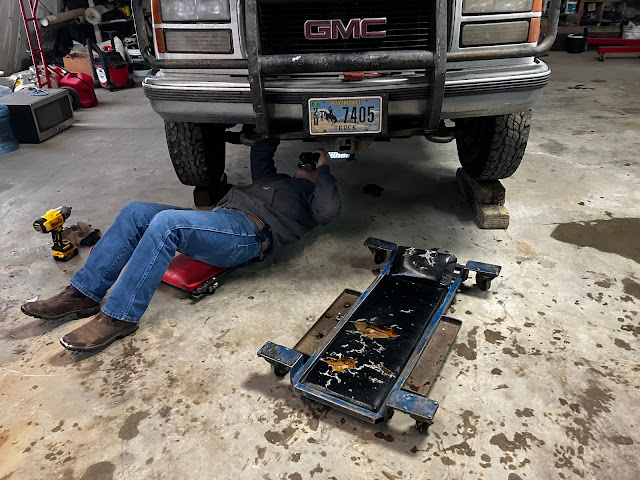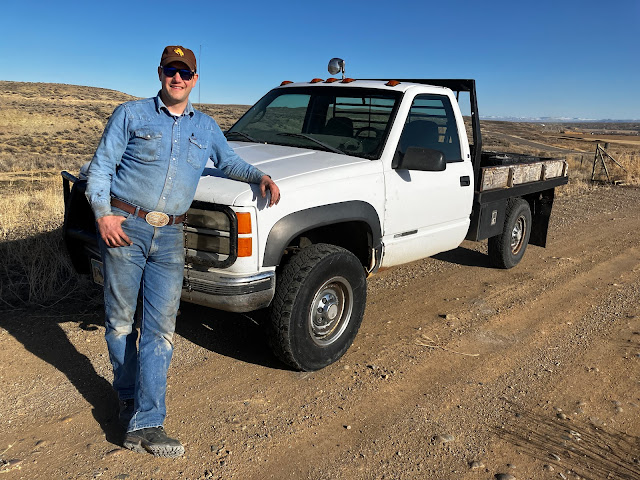There comes a time in every cowboy's life when he has to trust his gut and go against the grain. Such was the case when Ranch Truck went to knocking last summer. Gathering all the advice we could, we set out to bring her back to action. Let's just say, we got the job done.
One morning Dad fired this 1998 beauty up and bam! The engine started knocking. Not a fun knock either. More like, shut it off and call Bryce.
This Vortec 454 has been tough, but not trouble free. They are notorious for lifters going out, which I had replaced years ago.
We looked into the lifters but the sound was deeper, more like in the bottom end of the engine. We were pretty much convinced that it was a rod bearing.
Here's were the discernment came in. Most of my mechanic mentors said, Don't even bother with it, pull the motor. We were open to a different engine, but there were a few other factors to take into consideration. Putting a new engine in her, for no less than 3k, would be like putting new wine into old wine skins. Rebuilding this one would be cheaper, but who has the time. Finding a used engine from a junkyard was impossible, they're all taken. And, we still didn't know for sure what was wrong. So we decided to pull the pan and take a looksee.
I've heard of truck hoists, but Dad and I prefer creepers.
First step was to drain the oil. Right away it struck me as smelling like gas. Note to self.
Then we got the front driveline out of our way.
All this in an effort to drop the front differential so we could get to the oil pan. Chevy's are great, with their independent front suspension. Once we unbolted the short axles, the diff should drop right out.
Sure enough.
Then on to the oil pan. The bolts were easy to get to. And once loose, she came straight down.
At first glance, nothing. All the rod bearings looked good and tight.
Then we found these two chunks of metal in the pan. We were on the right trail.
Eventually we found it. On #8, the crank shaft was going up and hitting the bottom of the piston. Interesting.
Here's why, a bent connecting rod. But how did it get bent?
The whole time we were working under here and bumping the starter, gasoline kept pouring out of that cylinder. This oddity got us thinking. The only way a connecting rod would bend in this scenario, is if fluid got on top of the piston, causing it to hydraulic on the up stroke. A small amount of fuel with a lot of air will compress like it should. But a bunch of fuel and little air would hydraulic and bend or break something instead of reaching its full top-dead-center. We got to thinking that if the injector was bad, and wouldn't shut off properly, it could have this effect. This also made sense, since the truck had been flooding on us when we'd start and stop it often. We were on to it. So we devised a plan much to the chagrin of contemporaries.
Most mechanics would still replace the engine. Others would at least change the connecting rod. Us, we just ground down the crankshaft so it wouldn’t hit the piston and went back to work.
Now, you got to cut us some slack. Pulling the piston would obviously been a lot of work. But once you had the head off, would the wear lip around the top of the cylinder on a 200k mile engine let the rings pass by? Also, there was so much metal that ran through the oil system already, you might as well change the rod and main bearings too. Where does the can of worms end?
This is a ranch truck. She probably goes to town twice a year. It obviously runs with the bent rod, it just knocks. What damage is going to be done by grinding the crank? Getting metal in the system? Already has it. Unbalancing the crank? Sure, but will it be noticed. The other reality, no other option would likely ever get done. I get 24hrs of leave a week and spring time is coming. We have other things to do. Our conclusion, we've got nothing to loose.
So we cleaned up the bottom end and the oil pan.
And started going back together with everything underneath.
Then we tackled the injectors up top.
We changed all 8 while we were in there.
That was not an easy chore, in itself. But patience prevailed and we got it all put back together.
Runs good. There was a bit of a tick when it first started. No surprise. We didn't take off more of the crank than we needed to. But we figured we'd let the two find their happy mating surface. After getting it good and warm with a trip up the creek, sound was solved. She runs good, and better than before with new injectors.
Ranch ready.
I don't consider this redneck. I think we were just being practical. With new injectors that rod isn't going to bend anymore, especially with the compression being less because it can't reach TDC. The crank is probably out of balance. But it is 25 years old with 200k miles on it, it's probably been out of balance. Besides that, she's back in action. Any other remedy would probably never get done. It'd be expensive and take time we just don't have. I'd be willing to wager though, in 15 years old betsy will still be ranching around the place. On to the next one.


























No comments:
Post a Comment